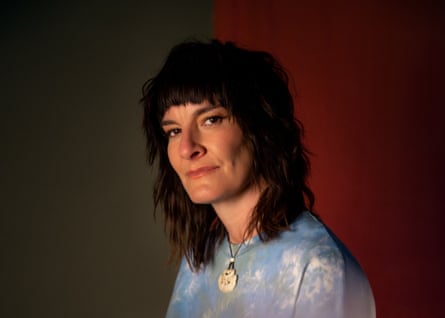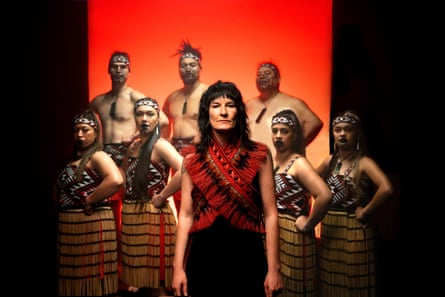There is a well-known Māori proverb: Ko au te awa, ko te awa ko au. Translated, it means “I am the river, the river is me”. For the Māori of Aotearoa, rivers are roads, supermarkets, home. The proverb can also be applied to fluidity and continuity; a recognition that change is part of being human.
I Am the River, The River Is Me is also the title the singer-songwriter Jen Cloher has given to their fifth album. It was an album born of intense upheaval: a breakup with former partner, Australian indie-rocker Courtney Barnett, in 2018 also led to the dissolution of their band, and the pandemic gave them time to think and reflect about who they were.
Cloher, who is based in Naarm (AKA Melbourne), now officially identifies as non-binary, with the pronouns they/she. On their last album, Cloher wrote a song called Strong Woman, a homage to their matrilineal line: “Proud my mother wanted respect more than love / and her mother taught her that she could want for more,” the lyrics declare.
“I’m very happily ‘she’, and I’m ‘she’ as I acknowledge the incredible line of women that I come through,” Cloher says. “I will always keep ‘she’ in my identification because of the honour and the great responsibility that I carry coming through that bloodline of extraordinary people.”
But at the same time, Strong Woman was also about not identifying: “When I was young, I wanted to be John / It wasn’t hard / Short hair, no curves to speak of.”
“I had a hard time growing up in Adelaide, really, as a trans kid,” Cloher says. “Even into my teens, I had people coming up asking, are you a boy or a girl? And, you know, I was stumped.”
Cloher’s mother, a celebrated Māori historian, was a Ngāpuhi and Ngāti Kahu woman from the northlands of Aotearoa. In their youth, Cloher would go back and forth from Australia, oblivious to the Māori legends their mother often hosted upstairs, quietly enjoying a gin and tonic. “I didn’t know any of that at the time, because I was a self-obsessed teenager.”
Cloher is sitting at their mother’s desk. Over Zoom, they show me a patu – a Māori weapon passed down their family line – as well as bone carvings by their uncle. At that desk, Cloher began writing “an intergenerational love letter” to their wāhine Māori line.
Slowly, I Am The River, The River Is Me developed into a complex but generous exploration and reclamation of identity. Its opening cut, Mana Takatāpui (takatāpui being the Māori word for queer), is “a celebration of seeing myself as queer and Māori in one word – takatāpui,” Cloher says. “What a gift! So simple. And also uplifting.”
It is. In 10 taut songs, with a new band including Anika Ostendorf (better known as Hachiku) – only stalwart drummer Jen Sholakis remains – the mood of I Am the River, The River Is Me is more often celebratory than downbeat. On the single Being Human, Cloher is backed by an explosive haka chant from Naarm-based Te Hononga ō ngā Iwi.

But Being Human is also an acknowledgement of country. For Cloher, there was tension between returning to reconnect with ancestors on one colonised island, when they live on another colonised island with its own fraught history: “My very presence here is evidence of that. I wasn’t invited here, you know, I’m an uninvited guest.”
The most challenging aspect for Cloher was getting over feeling like an interloper – of somehow being not Māori enough. “I didn’t know the language or the culture. So what right did I have? I think the erasure is complete when you can no longer see yourself, that’s the end product.
“I’m not disappearing my own whiteness. I’m pākēhā; my skin is white. I didn’t grow up in an oppressed community, living a really tough life in Aotearoa, like some of my cousins have done. I come from a lot of privilege. But it doesn’t mean that I can’t be part of the conversation, and that I can’t use my art to speak about bigger things that matter to me.”
It’s political, but Cloher counters that it’s also as personal as it gets. Musically, it’s a long way from her last two albums (both of which made the final shortlist for the Australian Music prize) but lyrically it links to Cloher’s earlier work, particularly her second album Hidden Hands.
In a song from that album, Watch Me Disappear, Cloher traced the pathway their ancestors took from Cape Reinga, in Aotearoa’s far north: “Where two seas meet to take you home, one last look back before you go.” The two seas are the Tasman and Pacific Ocean; Cape Reinga is where spirits would make their final journey to the Māori homeland of Hawaiki.
“The core of this album is saying we have a purpose as humans,” Cloher says. “We’re not a disaster, we’re not a scourge on the planet that just needs to go. We are here as a vital part of the relationality of earth and water and sky, and we’ve always been here, tending to the land and water.”
Cloher cites another Māori proverb: Toitu te marae a Tane, Toitu te marae a Tangaroa, Toitu te iwi: If the land is well and the sea is well, the people will thrive. “I guess what that says is, you’re not separate, you’re part of all of it, and your role is as a kaitiaki – caretaker – and that is an invitation for all of humanity.”

